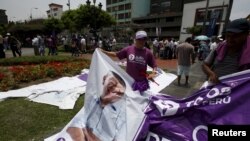Peru's electoral board kicked the main rival to presidential candidate Keiko Fujimori out of the race on a technicality on Wednesday, removing the front-runner's biggest obstacle to winning the office once held by her jailed father.
The board's 3-2 decision to remove Julio Guzman raises questions over the fairness of this year's vote and threatens to tarnish Fujimori's legitimacy if she wins.
Guzman, a centrist technocrat who was little known months ago, was the only candidate in a crowded field of hopefuls who was seen as nearly tying Fujimori in an expected June 5 run-off, according to recent polls.
The National Jury of Elections ruled Guzman cannot take part in elections in just a month because his party failed to comply with electoral procedures when registering its presidential ticket.
"No modern democracy excludes major presidential candidates, or any presidential candidate, for breaking minor rules," said Harvard University political scientist Steve Levitsky. "It's a horrible precedent to set."
Guzman has suggested Fujimori, the daughter of former authoritarian president Alberto Fujimori, and other rivals, were pulling strings to block his bid - allegations they stridently denied. Guzman previously said he would take the matter to the courts and summon street protests.
The decision over Guzman's candidacy bounced between electoral boards for more than a month, exasperating many Peruvians and stoking suspicions of foul play.
The head of the electoral board, who voted in favor of admitting Guzman, said February 26 he was receiving death threats.
The board on Wednesday also rejected an appeal to stay in the race from wealthy former governor Cesar Acuna for giving cash to poor voters while campaigning - a violation of a new law that prohibits vote buying.
Acuna had sunk to fourth place in the latest Ipsos poll amid separate allegations of plagiarism.
Recent polls suggest votes for Guzman and Acuna would be largely split among several candidates, with Fujimori and former prime minister Pedro Pablo Kuczynski benefiting the most.
Fujimori is still not expected to win outright next month, and voters could punish her in the second round if they feel the traditional political system pushed Guzman and Acuna from the race unfairly.
Guzman and Acuna both climbed in polls on the back of voter frustration with well-known but unpopular candidates, including two former presidents.
Peru's electoral institutions have not sparked so much controversy since 2000, when it let Alberto Fujimori run for a third term despite a constitutional ban.
Fujimori is now serving a 25-year sentence for human rights abuses and corruption committed in his 1990-2000 government.





